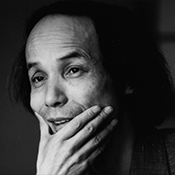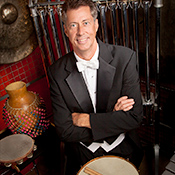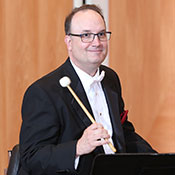
Third Coast Percussion Joins MSO for Visually Stunning Takemitsu Piece
David Lewellen
PUBLISHED
Tagged Under: 2023.24 Season, Guest Artist
Percussion isn’t so much an instrument as a state of mind.
“It goes so far beyond drums,” said David Skidmore of Third Coast Percussion. “We joke that a percussion instrument is anything that you ask a percussionist to play and they say yes. The mindset is exploration and openness and curiosity.”
Skidmore’s quartet, along with guest John Corkill, will solo with the MSO May 17-18 in From me flows what you call Time by Tōru Takemitsu, for five percussionists and orchestra.
“Percussion is an action more than an actual instrument,” Corkill said. “A trumpet is a trumpet. But we’re constantly figuring out different ways to play things. It’s a wide mishmash of instruments from all over the world, and if we’re handed something new, it’s ‘OK, let me figure it out.’”
One piece in Third Coast’s repertoire calls for all four of them to play recorders – which they can do better than a fourth grader but not as well as a Baroque soloist. “But that’s the part that we practice the most,” Skidmore said wryly. He added, “For the audience, that adds to the experience of a percussion concert – you don’t know what you’re going to hear.”
All of the soloists have played in an orchestra at one time or another (in fact, Corkill has often been a substitute musician with the MSO), but they have made a career out of presenting their own concerts.
Third Coast has never performed the Takemitsu work, but Skidmore said, “It’s one of the coolest things I’ve ever seen live. I’ve loved it for years, and I’m excited to do it with Ken-David,” referring to MSO music director Ken-David Masur. “I’ve worked with him in the past and absolutely adore him.”
The piece “feels like worlds colliding,” Corkill said, between orchestral percussion and the anything-goes ambience of a percussion ensemble concert. Skidmore added, “It pointed us toward what’s possible with percussion music. Takemitsu was an absolute master at the top of his game, a looming figure of the late 20th century.”
Third Coast Percussion has its own staff and office, which is unusual in the world of chamber music. But a string quartet has four instruments to keep track of – a percussion ensemble has hundreds. Their logistical challenges include “renting rehearsal space, transporting instruments, booking something as creative as our product,” Skidmore said. “We’re a relatively small team with a really healthy culture and a larger measure of control over our career. We respect the orchestra world, but we like the challenge of independence and the autonomy we have as artists.”
Corkill and the Third Coast musicians have known each other for 20 years, and he often substitutes with the group. “They’re hyper-organized,” he said. “I’ve seen their production sheets and their checklists. Every piece of equipment is in a spreadsheet.”
Percussion is often highly visual, too. “Every sound we make, you can see as an audience member,” Skidmore said. “That’s not really true of strings or winds. We avoid histrionics, but we are very expressive players, and there’s a choreography in what we do.”
Part of the Takemitsu work features the soloists out in the hall, using colorful ribbons to play hanging bells. “There are several striking visual elements to this piece, and it’s part of what makes us love percussion,” Skidmore said. “It’s as much ritual and event as composition.”
Corkill teaches at the University of Chicago and keeps a busy freelance schedule, but he said, “Creating new works is my life – getting in the sandbox and figuring out how to build the castle. Or seeing the castle fall apart.”



